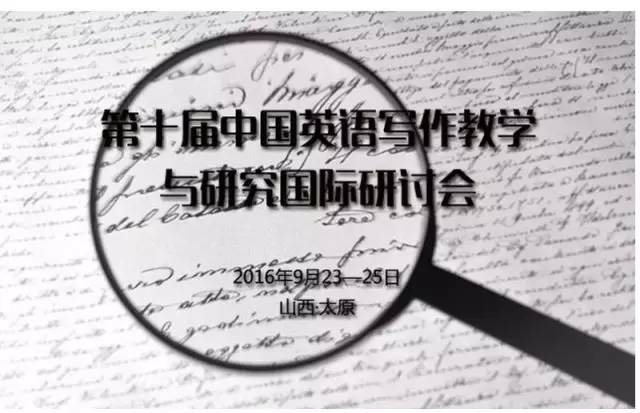会议丨“第十届中国英语写作教学与研究国际研讨会”专题预告(四)
2016/08/29

以“面向国际和职业交流的作为外语的英语及专门用途英语写作教学与研究”(Teaching and Researching EFL and ESP Writing for Global and Professional Communication)为主题的“第十届中国英语写作教学与研究国际研讨会”将于2016年9月23日-9月25日在太原理工大学召开。此次会议太原理工大学外国语学院承办,外语教学与研究出版社、高等教育出版社协办。目前,国内外130多所高校200余位专家、学者提交了交流论文,知名专家学者云集。为了使大家更好地了解会议有关内容,做好参会准备,获得更大收获,我们将利用会议召开前的这段时间,陆续以“会议专题预告”的形式进行介绍。
在此次会议“大会报告”专题,将有Charlene Polio (美国 Michigan State University,SSCI国际期刊 Modern Language Journal 主编),Guillaume Gentil (加拿大 Carleton University,SSCI国际期刊Journal of Second Language Writing 主编),Lawrence Jun Zhang (新西兰 University of Auckland,SSCI国际期刊TESOL Quarterly栏目主编),Paul Thompson (英国 University of Birmingham,SSCI国际期刊Journal of English for Academic Purposes主编),黄国文 (华南农业大学教授、博导、Functional Linguistics联合主编、Journal of World Languages联合主编、《中国外语》主编),王立非 (对外经济贸易大学教授、博导、《商务外语研究》主编),文秋芳(北京外国语大学教授、博导、《中国应用语言学》主编,《中国外语教育》主编)等多位著名专家围绕会议主题做精彩报告。本期向大家介绍黄国文教授和他的报告内容。
报告摘要:
As Halliday (1994: 106) argues, "Language enables human beings to build a mental picture of reality, to make sense of what goes on around them and inside them." Our construal of experience is affected by a number of factors and thus the same situation in reality can be represented by different process types with explicit or implicit participants and circumstances in terms of Transitivity (Halliday 1994). Erasure is a concept that is widely used in many different contexts in social science (e.g. Frohmann 1992, Namaste 2000, Barnet 2003, Ferber 2007, Baker & Ellece 2011, Stibbe 2014, 2015). The concept of erasure used in this paper refers to "the absence of something important -- something that is present in reality but is overlooked or deliberately ignored in a particular discourse" (Stibbe 2014), and the focus of discussion is on how and why the writer does the erasure. The paper will look at the impact language has on our representation of reality and illustrate how people erase something that is important in the process of construing experience, and this will be followed by the investigation of motivations (conscious) and reasons (conscious and unconscious) behind the erasure. Finally, the paper will discuss the implications for the teaching of EFL and ESP writing from the perspective of erasure in the construal of experience.
参考文献:
Baker, P. and Ellece, S. (2011) Key Terms in Discourse Analysis. London: Continuum.
Barnet, B. (2003) The Erasure of Technology in Cultural Critique. Fibreculture 1. http://journal.fibreculture.org/issue1/issue1_barnet.html
Ferber, A. (2007) Whiteness studies and the erasure of gender. Sociology Compass 1:1:265-282
Frohmann, B. (1992) The power of images: a discourse analysis of the cognitive viewpoint. Journal of Documentation 48(4): 365–86.
Halliday, M.A.K. (1994) An Introduction to Functional Grammar (2nd edition). London: Arnold.
Namaste, V. (2000) Invisible Lives: The Erasure of Transsexual and Transgendered People. Chicago: The University of Chicago Press
Stibbe, A. (2014) Ecolinguistics and Erasure: restoring the natural world to consciousness, in Chris Hart and Piotr Cap (eds) Contemporary Critical Discourse Studies. London: Bloomsbury Academic, pp. 583–602
Stibbe, A. (2015) Ecolinguistics: Language, ecology and the stories we live by. London: Routledge.


